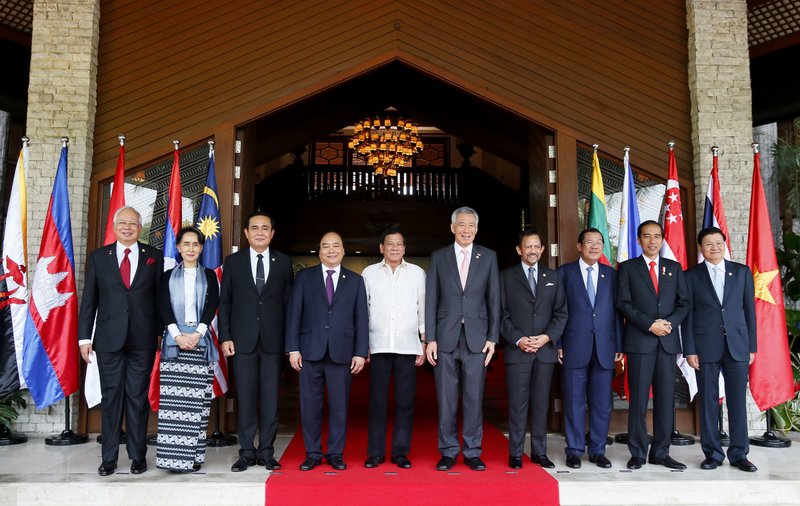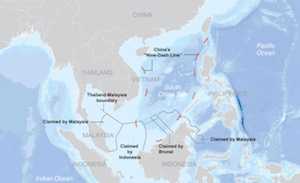MANILA, Philippines -- Southeast Asian leaders ended their annual summit in Manila on Saturday without any sign that host Philippines raised its crucial arbitration victory against China over disputed South China Sea territories.
President Rodrigo Duterte had said he would not raise the July 12 ruling, which invalidated China's long-held claims to most of the disputed waters, as he moved to warm once-frosty ties with and secure infrastructure funding from Beijing.
Duterte, who took office in June, has promised to take up the decision with China during his six-year term. The 72-year-old leader, however, faced calls to bring up the ruling in the summit of leaders of the Association of Southeast Asian Nations that he hosted Saturday.
A final draft of the communique Duterte would issue after the summit did not mention his country's arbitration ruling against China.
[INTERACTIVE MAP: Claims to the South China Sea]
An alternative phrase, "full respect for legal and diplomatic processes," was removed from a South China Sea chapter and moved elsewhere in the draft statement as Chinese officials have requested, three Philippine officials said on condition of anonymity because they were not authorized to discuss the issue with reporters.
"Non-mention of The Hague ruling would be a diplomatic triumph for China," said former Philippine national security adviser Roilo Golez, referring to the European tribunal that issued the decision.
"It might embolden them to advance some more in their South China Sea master plan," said Golez, who has called for a stronger Philippine response to increasingly bolder steps by China to assert its claims in the disputed sea, one of the world's busiest.
Duterte has said he would not take up the arbitration ruling at the summit because it was an issue between China and the Philippines and did not concern other members of the 10-nation regional bloc.
Aside from the Philippines, Association of Southeast Asian Nations members Brunei, Malaysia and Vietnam also are involved in the territorial conflicts, which many fear could spark the next major armed conflict in economically bustling Asia. China and Taiwan constitute the rest of the claimants of the waters that are believed to be sitting atop potential oil and gas deposits.
Concern over the standoff between North Korea and President Donald Trump's administration also was high on the agenda of the summit.
Duterte suggested Saturday to his U.S. counterpart to back away from an intensifying standoff with North Korea, not in surrender but to avoid risking a nuclear holocaust that could smother Asia.
"It behooves upon America, who wields the biggest stick, just to really be prudent and patient. We know that we are playing with somebody who relishes letting go of his missiles and everything," he said.
Duterte agreed Saturday with Japanese Prime Minister Shinzo Abe that negotiations to end the standoff would be useless. Abe, in London, said talks with North Korea shouldn't be tried while the communist nation continues its "provocative acts."
Abe spoke as China's official news agency, Xinhua, urged Trump to "tread cautiously" with the U.S. and North Korea locked in a "tit-for-tat" vicious cycle. Duterte, meanwhile, compared the standoff to two countries playing with toys, "and those toys are not to entertain."
North Korea's latest ballistic missile test early Saturday came hours after U.S. Secretary of State Rex Tillerson mounted an effort at the United Nations to rally pressure against Kim Jong Un's government.
Trump has stepped up pressure to prevent Kim from obtaining the capability to hit North America with a nuclear weapon. He has threatened to act unilaterally if China fails to do more to curb its neighbor's activities.
During the daylong summit, the spotlight also was on Duterte.
Duterte faces a mass-murder complaint before the International Criminal Court and an impeachment bid at home as bodies continue to pile up in his anti-drugs campaign.
Duterte found solace from the storm of criticism in the Association of Southeast Asian Nations, which has a bedrock policy forbidding member states from meddling in each other's domestic affairs.
That has helped the association, founded a half-century ago, to become an unwieldy collective of dictatorships, authoritarian states and a monarchy, along with fledgling democracies.
Information for this article was contributed by Jim Gomez and Teresa Cerojano of The Associated Press and by Joe Easton, Linly Lin, Charlotte Ryan and Takashi Hirokawa of Bloomberg News.
A Section on 04/30/2017


